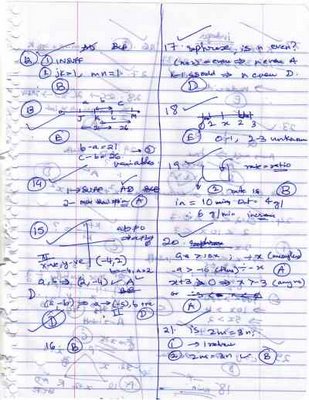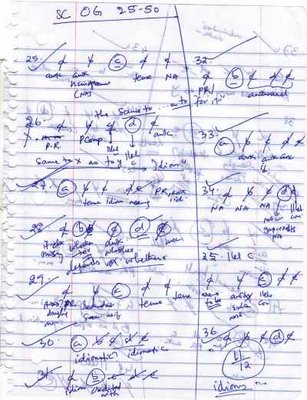GMAT 420 to 700!
Yes, this guy made it happen and if you're depressed because you had a bad day at the exam - take heart and get back to studies.
| Materials used in my preparation | |
|
The official GMAT |
Bible for preparation - this is an absolute must |
|
MGMAT series (recommended) |
The best overall preparatory series |
|
Terrific SC Preparation Guide |
Mandatory for SC preparation - especially non-native speakers |
| Kaplan 800 | This one actually has some solid CR and DS strategies |
| Princeton Review | Useless DVD but SC and the quant practice is good, the online tests are good |
| Official Quant Companion | Extra practice - 300 official questions |
Yes, this guy made it happen and if you're depressed because you had a bad day at the exam - take heart and get back to studies.
Labels: gmat
If you don't know yet, you do not get scrap papers when you appear for GMAT. What you get instead is a laminated write board/note board (or whatever it's called). It's a 4-sheet book with glossy, plastic, yellow sheets and you get a dry eraser marker pen.
Many people have had problems with this (and you will find many more complaints here). Of the common complaints are (in no particular order of occurrence)
1. "It made my hand dirty"
2. "I ran out of sheets! I had to wait for the administrator to give me a new set and it wasted time"
3. "it's uncomfortable!"
For (1) and (3) there's really no cure. Getting worked up about a dirty hand or the evil markers is the last thing you should worry about when writing the exam.
For (2) one of the possible reasons could be is the way people use writing sheets. Typically, horizontal space is rarely filled when you work out your problems - so usage of real estate is very poor. You then run out of sheets quickly, here is an example of inefficient usage of writing space (a sheet from one of early GMAT practice sheets) Notice the amount of space that's wasted. It's even worse in verbal because you would write a,b.c.d.e and the rest of space to the right would be unused. This causes sheets to get over quickly, you also write in a haphazard way around the page and then worry about getting new sheets.
Notice the amount of space that's wasted. It's even worse in verbal because you would write a,b.c.d.e and the rest of space to the right would be unused. This causes sheets to get over quickly, you also write in a haphazard way around the page and then worry about getting new sheets.
Look at the 2 sheets below - 1 for quant and 1 for verbal, these are after I changed my practice style and divided the work area to two halves. It may look cramped to you (you can use more space, I prefer tightly controlled writing spaces) but see how much detail I got in there. Besides, the writing is controlled so your mind doesn't mix the working of a different problem with the current one. I used the exact same style in GMAT as well, and I was done within 3 sheets. Every moment saved is a possible 10 point earned.

My own personal experience was that I actually liked the sheets and the marker. So don't get all worked up about this, the only other important tip I can offer is
Test the marker before you start the test
Many times, the markers would have dried and you don't want to panic when you start quant. I tried the marker immediately on seating, and discovered that it wasn't working. So I got a new one before I might have lost my cool, which we all know, is critical in an exam like this.
Hope this helps!
Labels: gmat
I've been reading some blogs and adcomm interviews where they all talk about "being yourself" in an essay. And then you have many people saying "edit your essay, have it proof-read, re-do it, review it, make 5 people read it.." and I see a problem with this.
The more the people read and make comments and incorporate them, the less it becomes "being yourself." The exception to this being corrections to syntax and grammar. Let me show an instance.
I like adding a smiley here and there, a light banter when possible, an exclamation to highlight a point - things that make my paragraph more "me." For e.g.
"I wanted to be a 28 year old millionaire! But over time, I've realized that it takes a lot more hardwork to actually be one at any age...so now I'm hoping to see 7 figures when I'm 45 :)"
now - let 5 people review this, of which 3 maybe rather serious and think that the smiley or the banter is "out of place" in a serious essay. So after a lot of review and edit, I could maintain the content and turn it into
"After realizing that I could not become a millionaire at 28, and that it would take a lot more hardwork to become one at any age, I have now set my goals and am striving to achieve such a position by the time I am 45."
Sure, the second one is more staid and is rather serious. But it isn't "me." If I take an essay that is 500 words, and then remove my style and rewrite it based of multiple inputs, it's no longer my style. I have a problem with that. What I think is a more appropriate thing to do is
1. Reviewers should comment not on style, but only substance. If you think my rationale of why I want an MBA looks weak and unconvincing, say so. But if you focused on how I said it (assuming no grammatical or syntactical errors), then you would alter my style and miss the point entirely.
2.Tell me if my sentences are wrong, or are badly formed. Be a grammar nazi, and for once I won't scream at you for being one.
3.If you know me well, give me ideas on what else I could highlight. Let me worry about the "how."
I'm writing my essays now, and these questions do haunt me. Am I forcing myself away from my natural writing style? Will a business school find my writing too informal (or conversely, too formal?). So instead of worrying too much about all this - I'm going to go ahead and be myself. That means smileys, exclamations, silly sentences, anecdotes and other personal embellishments. I got away with them even in my company performance evaluations, and I hope it won't butcher my changes in school applications. You might disagree with me. Well, what do you think?
Labels: applications, MBA
If there are word limits for essays, then brevity and precision are important. Brevity is to tell whatever you want to tell, briefly. Precision is to convey what you want to tell, accurately. It's perfectly possible to be brief and say nothing.
Example 1:
Original: I would like make a substantial contribution to my company's decision making process and play significant part in my company's strategy (21 words)
=
Brevity: I would like to play a substantial part in my company's strategy and decision making (15 words - a saving of ~30%
You're saying the same thing, in a shorter version. The words you save can help add more content to the essay.
Example 2:
Original: I played an important leadership role in my company's quality initiatives and disseminated process knowledge across the company.(18 words)
=
Brevity/Precision: As the lead quality auditor for my company, I trained different departments on processes.(14 words - 22% saving)
You're saying the same thing, with less words and greater precision. No vaguess about "some leadership role", the words "lead quality auditor" say a lot more.
Right now, I'm working through my initial essays. My strategy is to first write what I want to say, without worrying about word limits. Then, I apply these steps,
1. Are there repeating themes in the paragraphs? does anything repeat? remove them.
2. Are there "fluffy fillers"? hot air words that don't mean much but take up space? remove them.
3. Can some words be removed without significantly altering meaning? remove them.
4. Can I say the same thing by reorganizing the sentences?
By the time I'm done, I've usually cut nearly 30-40% of the original size, so I have that much space left to say other stories.
Labels: applications, MBA
These are what I'm targetting
So what if my GMAT score is above average? I have several limitations I need to deal with,
Taking the GMAT and facing a painful result can be depressing. It can happen to smart, supportive people who were a source of inspiration to many others. Whatever I say will probably be pedantic and "arm-chair" exercise, because I took GMAT only once. When I walked out the test center, and discussed it at home, I did think many times how things might be if I scored lower - and even the thought was disconcerting.
However, what I can say based on my preparation and what I read, is this,
Labels: gmat
Percentiles haven't changed - and got a 6.0 on AWA. *phew*, that ends my GMAT saga...now the application saga begins.